The articles in this subject-dossier in the seventh edition of Electra reflect and extend this inter- and multi-disciplinary issue that has taken centre stage in public opinion, with highly visible effects in the field of contemporary bio-politics and of theory and critical analysis. It calls upon a range of knowledge and know-how and brings cultural assumptions into perspective. A new field of study thus emerged about 20 years ago and has become increasingly significant, especially at American universities. It is called animal studies. In line with the creation of ‘woman’ and ‘female’ categories in feminist theory in the 1970s, animal studies introduced the ‘animal’ category to the human and social sciences. They gave animals a social and cultural status and subjectivity. They interact with humans and cannot be reduced to mere subjects of studies in zoology, ethology, biology or anthropology. Animal studies accompany a new sensitivity, which is regarded as a new civilizational characteristic that rejects the highly anthropocentric vision of animals as humans’ slaves and food sources. Animal studies focus on these interactions and intersections between human and non-human animals and perform an analysis and critical representation of the social constructions and meanings that animals have in our culture. This analysis has shown that many of these social meanings, as they were traditionally transmitted and still persist, serve to legitimise and perpetuate hierarchies based on racism, sexism and classism.
As we can easily see, animal studies have flourished alongside animal defence movements and philosophical debates on the ethical issues that should cover animals and on the extent of their inclusion in the sphere of justice and politics, from which philosophical tradition, from Aristotle to Heidegger, excluded them. Two fundamental books are generally considered to be behind animal studies in the academic field: Animal Liberation (1975) by the Australian philosopher Peter Singer and The Case for Animal Rights (1983) by the American Tom Regan. These two books also had a certain influence on the attention devoted to animals today by public opinion, which generally condemns cruelty to animals and has become open to the discussion on humans’ duties towards them and bans that must regulate this relationship of power. In recent years, it has become much more difficult to justify many of man’s practices involving animals, to the point that meat eating has generated moral and ecological discussions and these two issues have merged.
The meat industry is being regarded with increasing hostility. And it is no coincidence that abattoirs are the most secret places in modern cities. They feature in hardly any images or news reports. These prohibitions and this concern for keeping the whole process out of the public eye fuel an analogy that always brings controversy. It is that of comparing the industrialisation of animal slaughter and the Nazi extermination camps (see the article by Alessandro Dal Lago in this dossier). Eternal Treblinka: Our Treatment of Animals and the Holocaust (2001), a famous book by Charles Patterson, an American historian, enshrined this vision of animal slaughter as a mirror of the Holocaust. The reference to Treblinka comes from a quote by the Jewish American Isaac Bashevis Singer, awarded the 1978 Nobel Prize for Literature, who once wrote, ‘In their behavior toward creatures, all men are Nazis. […] for animals, life is an eternal Treblinka.’
Derrida says we should not harp on this comparison but we cannot immediately disregard it. Derrida devoted a seminar (published in L’Animal que donc je suis, 2006) to the ethical and political dimensions of the ‘animal question’ and particularly the oblivion into which philosophy threw animals. (The famous book by Élisabeth de Fontenay, Le silence des bêtes: la philosophie à l’épreuve de l’animalité, 1998, developed this issue.) This gap could not be filled by any animal poetry, like that of Kafka, for example. It is easy to understand how animals were forgotten by philosophy. This was because language, thought, awareness of mortality, culture, i.e. all things that make up the field of reason (in the Greek sense of logos), worked as a guarantee of the impregnable ‘us’ (which underlies a metaphysical humanism), separated from ‘them’, animals, by an insuperable line: it is the so-called zoo-anthropological difference, in whose service the most powerful machine that human culture has ever built is in operation, however much Darwin may have shown that the difference was one of degree.
This insuperable red line between humans and animals was breached when it was recognised that ‘they’ suffer just like ‘us’. When faced with this recognition, we either go into denial or become more or less sensitive to their suffering. The word ‘empathy’ is compulsory in the critical lexicon of animal studies. As is the case with ‘speciesism’, this concept was forged in the early 1970s by analogy with the ideas of racism and sexism. In order to track the origins of the sensitivity that makes us acknowledge animals’ suffering, we have to go back to Jeremy Bentham. It was in 1789, the year of the Declaration of the Rights of Man and of the Citizen, that, in his Introduction to the Principles of Morals and Legislation, this English philosopher devoted a passage to man’s cruelty to other animal species. Bentham’s well-known quote provides the principle of a moral law that has recently come back to the fore: ‘The question is not, Can they reason? nor, Can they talk? but, Can they suffer?’ By asking these questions and favouring the criterion of sensitivity over that of rationality, Bentham was the first moralist to insist on the rights of animals. (In 1829 he was invited to join one of the first associations for the prevention of cruelty to animals.) He was also the first person to compare the possible – and, in his mind, desirable – extension of human rights to animals, just as the concept of person was extended to women and slaves. If it was possible to recognise that slaves had been the victims of a criminal error, of totally flawed categorisation, then who can guarantee that a similar mistake has not been made with animals, which, like us, have the capacity to suffer? Bentham was the founder of what we now call utilitarianism, of which Peter Singer is the most famous representative. Utilitarianism means defending the optimisation of pleasure and minimisation of pain in sentient beings.
Broadly speaking, this is the contemporary environment and tradition in which we find the ‘animal question’. It underscores the topicality and pertinence of this dossier of Electra, which echoes the insistence on and manifestations of this issue. We need to realise that it is vast and extends along a theoretical horizon, and one of critical reflection, where ideas such as humanity vs. animality, the post-human, and animal politics stand out, marking the thinking of our times.
*Translated by Wendy Graça
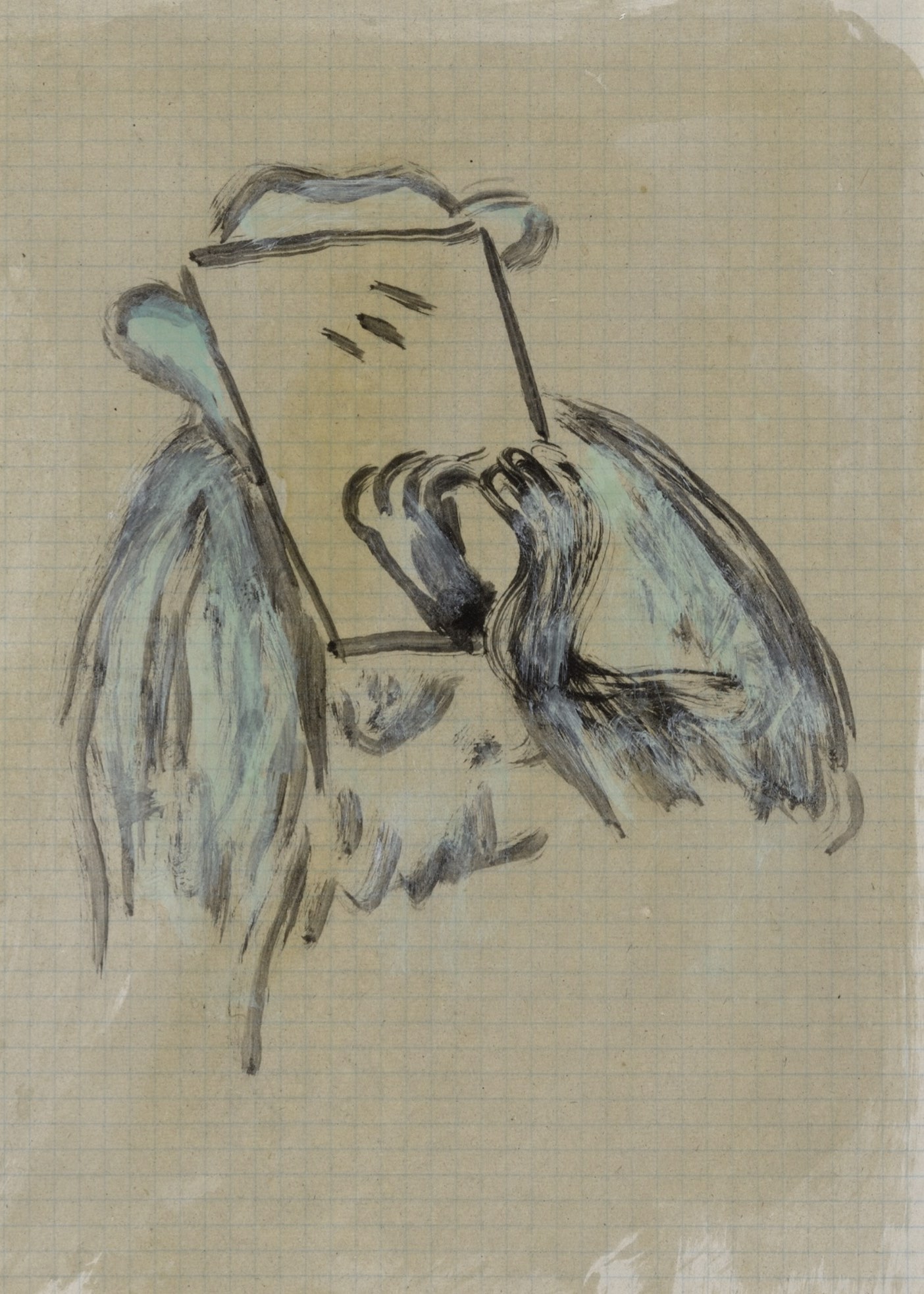

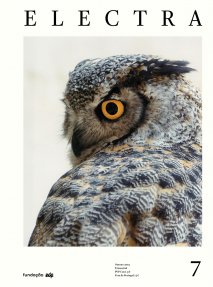
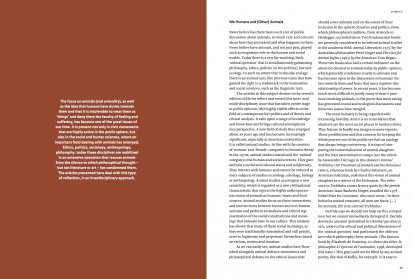
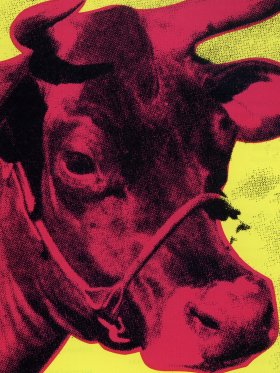
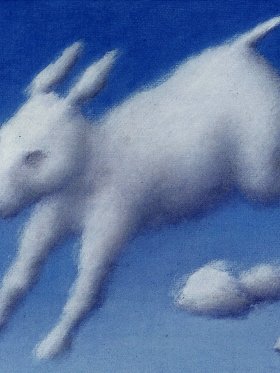
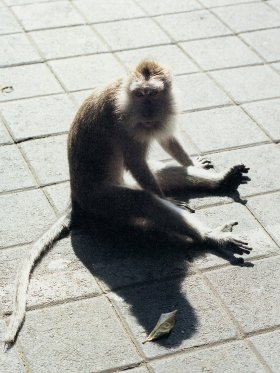
Share article